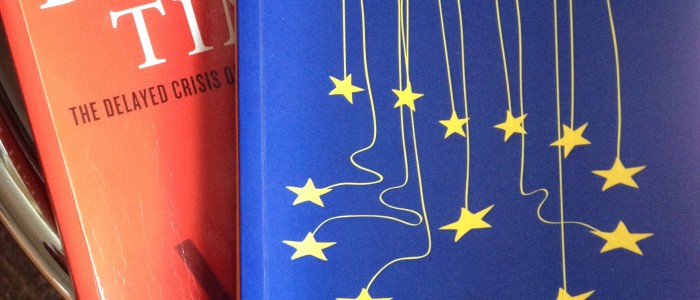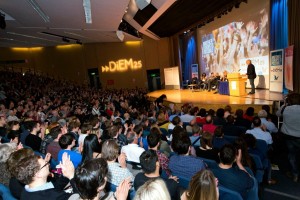Varoufakis, the former Greek Finance minister and radical leader of DiEM25 a grass roots movement to democratise the EU, urged progressive members of the Remain campaign, to confront the complete “failure of progressive forces to harness the anti-establishment rage”.
And its true, from the outset, we struggled to find a voice that resonated beyond our own echo chambers. Complex nuanced arguments never crystallised into potent rhetoric or cogent images. The language was too technocratic, sounding like so many unwanted memos from the -expertocracy- Nothing in our rhetorical armoury could match Take Back Control or – Our Independence Day-. The challenge across Europe will be to better understand the appeal of these slogans do we stand a chance of matching it. Serious hard thinking must be matched by communications that can function in the -social media vortex-.
Another Europe
DiEM25 have at least boiled things down to a four words slogan -Another Europe is Possible – Its not bad but as rhetoric it lacks real immediacy or populist bite, but its a start. And it has the advantage of deliberately opening up a conceptual space by echoing the popular activist slogan -Another World is Possible-. This is useful because it straight-away puts a wider utopian agenda on the table. By cleverly hinting that democratic European integration as a decisive stage in our evolution towards a post-national world order. Progressive internationalism by other means…
The trouble is that outside of radical circles (including radical neo-liberals) practically no one believes in a Trans-national vision of Europe. It is tarnished as an autocratic federalist -superstate- How can DiEM (and others committed to -another Europe-) contest the perception that more Europe must mean less democracy?
Certainly without a profound (almost revolutionary) deepening of European democracy the EU project and the Union, it is doomed to remain the world’s most successful Hayekian social dictatorship, in which the market is forever separated from politics .
Habermas vs Streeck
As we saw from Labor’s campaign of energised equivicaction, not all Euro skepticism comes from the right. For a serious discussion on what is at stake thebest places are the sites where the argument has unfolded between two German thinkers; the influential philosopher, Habermas and the sociologist Wolfgang Streeck. And perhaps begin with two short, important and highly readable books. Habermas’s, The Lure of Technocracy, a warning against technocratic instrumentalism and a plea for European solidarity and an argument to keep faith in its institutional architectures, however flawed. Wolgang Streeck’s, Buying Time, The Delayed Crisis in Democratic Capitalism. In the final chapter in which, Streeck argues that the EU is nothing less than an un-reformable deregulation machine “that has failed to protect nations from a capitalism gone wild but rather exposed them to it lock stock and barrel.- It was from this perspective the news paper Die Zeit asked Habermas, in a post-brexit interview, why not return to the old welfare state capitalism? Suggesting that far from -Another Europe being possible-In the real world – a unitary -Jacobin constitution for a democratic European state is unimaginable. P172
As for the belief that the answer lies in -democratisation- Streeck responds (rhetorically) by asking whether -democratisation could calm the conflicts that are today tearing Europe apart. -Could it stem the centrifugal forces that have arisen from straightjacketing of diverse societies in a common market and a common currency and the stripping of their capacity to act. P.177
For Streeck, Habermas’s approach is in its own way profoundly technocratic with its faith in constitutionalism. For Streeck there is failure to recognise that capitalism is not just a mechanistic system but a space populated by real interests with real agency who will protect its privileges at all costs. This is a real danger, and a hangover from the aspect of the Frankfurt School whose crisis theory of capitalism on the basis of economics to resistance in the cultural sphere. The question is does DiEM and Varoufakis offer a model that is better aligned to current political realities ? If so I haven’t yet seen it.
For Streeck the huge task of reversing the devastation wrought by four decades of neoliberal progress, should not be wasted in the utopian delusions of pan Europeanism
but rather defending and repairing what is left of the institutions -with whose help social justice might be able to modify or even replace market justice- P173-174.. it is only in that context that it seems meaningful to speak of democracy today, since it alone makes it possible to avoid being “fobbed off” with the democratisation of institutions that have no power to decide anything. -
At the heart of Streeck’s opposition (and the most tangible differentiation with Habermas) is his hostility to the Euro “a frivolous experiment (Polyanyi) following which follows prescriptions of standard economics is to reshape a highly heterogeneous transnational society into a market society, with no regard for diverse structures, institutions and traditions… He sees it as the modern equivalent of the Gold standard and argues that abandoning it would release energies as valuable as those released when the Gold standard was dropped.
The difference between Habermas and Streeck is not ideological but strategic, empiricle and practical. For Streeck, Hayekien neo-liberalism is simply too strong, too embedded to be reversed at this stage. Unlike its Hayekian rival, the movements seeking to democratise Europe at this stage would be swimming against the historical tide…. -The huge Hayekian lead means that implementing the Utopian model appears completely unrealistic.
Defeatism Disguised as Pragmatism?
The fact that the neo-liberal project was a long game played over generations should be a reason enough to avoid Streeck’s defeatist conclusions. Even a long journey must begin somewhere.
And from the off shore Island where I am reluctantly sitting now seems like a good time to join my Contiental frends in fighting to deepen European democracy and open up the boarders.
From this vantage point Streecks’s position feels like a regression. Regression to a welfare state nationalism that no longer exists. At least we can test this propistion in the coming years
as Brexit proceeds (poor us!).
In an extended Review of Buying Time, Habermas described his conclusions of how we should position ourselves to the EU as a nostalgic return to sovereign impotence of the nation state
when we consider the epoch-making transformaion that nation states have undergone-from states that still exercised control over their territorial markets into disempowered co-players embedded
in globalsied markets. A journey towards a “supranational, but trans-state, democratic political community that permits joint governance also satisfies the conditions of democratic legitimation
is a project of many generations.
This is not the bogyman of a -Federal Superstate- its a Europe in which we are able to be both European citizens and citizens of our individual member states. If this sounds artificial we must remember that -the nation state also began as a highly artificial form of solidarity among strangers based on legal and constitutional arrangements.
The fact that we deal with artifice should remind us that the deep flaws in the EU to which Streeck points are NOT a state of nature. We must understand that the painful detailed work of both opposition and re-design must mean holding fast to the idea that democracy must mean above all that social justice stops being reduced to market justice.


Comments are closed.